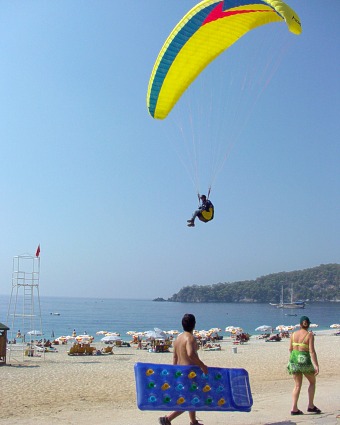We all like flying. Unfortunately, sometimes things do not go exactly as planed and we end up with a totally different activity: bush walking or swimming, for instance. Landing in the water, needles to say, is a health hazard. But even such an innocent event like tripping on a beach landing and rolling in an ankle-deep puddle can be very painful - for your pocket. An average hang glider or paraglider pilot carries at least $1000 worth of electronic equipment on him nowadays. These things do not need much salt to be rendered worthless; as little as a few drops of sea water and that often is it. I've seen enough of these: Our swimming pool serves as a regular "first aid" for canopies of those pilots who "didn't quite make it" on the east coast. Unfortunately, by the time they arrive, it is far too late for their high tech gadgets. Knowing what to do after flooding your toys by that solution of sodium chloride can save you a fortune - but not always. The little factor called luck is always needed here as well. The actions described below are acts of desperation, but they are worthy of trying. Once the item has been in salt water, there is very little left for you to spoil...
The most important part just after the flooding is the speed by which you remove the batteries. Do not waste time by switching the gadget off. Not only it is useless (salt water is highly conductive and will bridge the contacts regardless), but you may even destroy the switch! And worse: if the instrument case is almost watertight and there is a couple of minutes delay, the electrolytic process will fill it with an explosive mixture of hydrogen and oxygen. Your action will produce the last important ingredient for a good blast: The spark.
The first objective is to remove the batteries. In fact, you often have only a few seconds to perform this task and still have some chance of success. All the following effort will help only if you were fast enough on this primary task! The batteries safely out, take the unfortunate gadget and drop it unceremoniously in a bucket of fresh water. Leave it there for some 15 minutes, stirring occasionally. Even if it doesn't help, at least you'll attract a crowd of spectators and you can charge some moderate fee for the show. Then you can relax a bit. Drive to the nearest petrol station and buy a couple of litres of distilled water, by which you replace the existing brine, From now on the treatment will vary for each different kind of equipment.

Devices with some mechanical and optical components (cameras) shall be left in the water, the container filled to the top, made airtight and delivered ASAP to a specialised service facility. Look for people specialised in drowned equipment - they advertise in SCUBA diving magazines. A regular service technician might send you, well, somewhere else. If the camera was a modern SLR (the past tense here is fully justified), don't bother. Give it to your 3-year-old. If you get a smile in return, smile too. You've made a bargain!
|

With radio gear, varios and similar you have a good chance even without professional help. Leave the items in the distilled water for about 2 hours and stir a few times. After that, put them briefly in methylated spirits, blow off with a low pressure compressed air and place them in an oven (not microwave!) heated to 50°C for about 4 hours. After cooling down, spray all switches, contacts, potentiometers and metal parts by a water displacing lubricating agent, like CRC2/26. Keep this stuff well away from RF parts (especially varicaps) pressure sensors and soft push buttons. It can cause some problems there. Now you are ready for the moment of the truth. In most cases everything will work like a chime! Often only a speaker, with a paper diaphragm, suffers and has to be replaced; otherwise it will sound like, well, my own radio. A very cheap experience indeed! If it doesn't work at all, see professionals.
The rechargeable sealed battery packs need special attention too. Take the word "sealed" with reservation. They will positively let the salt water in, SEALING it perfectly inside - hence the name. Such a pack will become a serious fire hazard and it will fail shortly, often with spectacular sound and light effects. To give you some idea what it can do, I can show you (for a small fee) my own radio. To eliminate this time-bomb factor, discharge THE PACK THOROUGHLY ASAP through an automotive globe or a similar load. Never shorten it! Until it is completely flat, wear glasses and gloves as it can explode at any moment. Then break it open, wash and dry thoroughly in similar fashion as described above and glue it back together. If you do not want to bother with the above, GET RID OF IT! Beware; none of the drowned items is as healthy as it looks now: DO NOT FULLY TRUST THEM AGAIN!
The most effective, but highly unethical solution is to sell them quickly to an unsuspecting enthusiastic. If you want to keep them, replace all insulated wires inside (usually, there are not many of them) within about a month. The salt water seeped under the insulation and there is no way of getting it out. After powering the gadget again, it will start eating the core at a surprising speed. The terminals or soldered ends will usually fall off within a few weeks. After the wires exchange you can expect ALMOST the original reliability.
Finally, for god's sake, do not fall for some much faster and simpler treatments, unless you want to make sure nobody will be able to fix your gear ever again! One of the recipes circulating here is, to wash the items in VINRGAR, which Neutralises the see water! Mere spraying them with some moisture-displacing agent is, at least, almost harmless, but equally useless. And the last advice: if you are being offered a second hand electronic device, look for the telltale greenish-blue deposits of copper chloride around the positive terminals. If these are present, politely decline the offer, even if it looks like a deal of the century!
|

